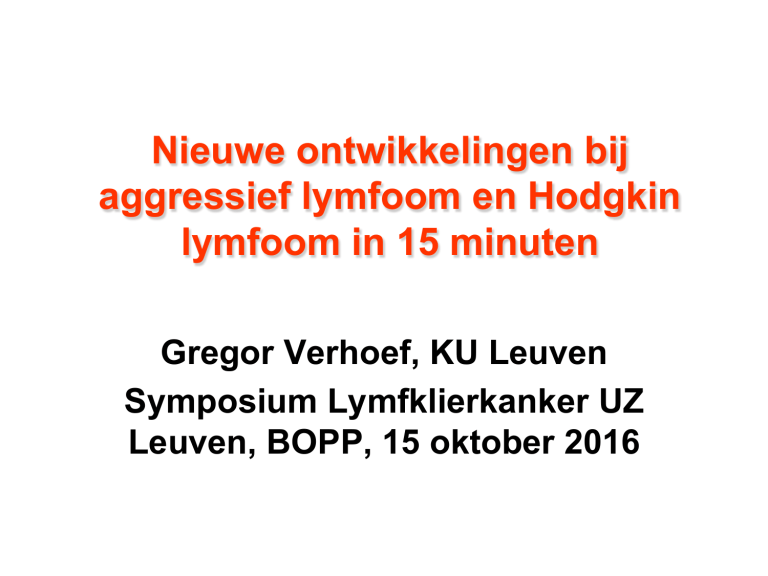
Nieuwe ontwikkelingen bij
aggressief lymfoom en Hodgkin
lymfoom in 15 minuten
Gregor Verhoef, KU Leuven
Symposium Lymfklierkanker UZ
Leuven, BOPP, 15 oktober 2016
Wat is een lymfoom
•! Kanker of kwaadaardige ziekte van de
lymfeklier
•! Een uitzaaiing van een ander gezwel (b.v.
borst) naar een lymfeklier is geen lymfoom
•! Verzamelnaam van verschillende
lymfeklierkankers
Een lymfoom
•! Is niet meer dan een verzamelnaam van
verschillende soorten van kanker van de
lymfeklier
Burkitt's
mantle cell
AILD
immunocytoma
follicular
anaplastic large
cell
peripheral T
cell
small
lymphocytic
diffuse large B
cell
Grootcellig B-lymfoom
(diffuse large B-cell lymphoma)
• Meest voorkomend lymfoom
• Altijd behandelen!
• Maar gedraagt zich bij iedere patiënt weer
anders, dus ook kansen op genezing
verschillen onderling
Behandeling aangepast aan de
individuele patient?
•! Toekomst:
–! Behandeling die volledig op de “individuele” patiënt is
afgestemd en met grote voorspellende waarde op
succes
Lichte vorm
van behandeling
Zware vorm
van behandeling
(Nieuwe) ontwikkelingen bij DLBCL
• Verder “subtyperen” van grootcellig lymfoom
• Bij relaps (jonge patient): tweedelijns chemotherapie
(DHAP), stamcelcollectie
– G-CSF
– Plerixafor (mozobil)
•
•
•
•
•
•
En transplantatie (BEAM)
Lenalidomide (revlimid)
Ibrutinib
Velcade (proteasoomremmer)
Copanlisib
In combinatie met chemotherapie
Aggressive B-cell lymphomas in WHO Classification
2008-2016
Entities
Diffuse large B-cell lymphoma (DLBCL), not otherwise specified
Common morphologic variants
Centroblastic
Immunoblastic
Anaplastic
Rare morphological variants
Molecular subgroups
Germinal centre B-cell-like (GCB)
Activated B-cell-like (ABC)
Immunohistochemical subgroups
CD-5-positive DLBCL
Germinal Centre B-cell like (CCB)
Non-germinal centre B-cell-like (non-GCB)
Diffuse large B-cell lymphoma subtypes
primary DLBCL of the CNS
Primary cutaneous DLBCL, leg type
T cell/histiocyte rich large B-cell lymphoma
EBV+ DLBCL of the elderly*
CD10+
Ki67 100%
Bcl6MuM1-
CMYC+
Courtesy T. Tousseyn
Diagnosis and outcome of DLBCL subtypes by GEP. (A) Heat map showing differential
expression of genes in GCB, ABC, and PMBL DLBCL subtypes.
Wilson W H Hematology 2013;2013:584-590
Nieuwe ontwikkelingen bij DLBCL
• Verder “subtyperen van grootcellig lymfoom
• Bij relaps (jonge patient): tweedelijns chemotherapie
(DHAP), stamcelcollectie
– G-CSF
– Plerixafor (mozobil)
•
•
•
•
•
•
En transplantatie (BEAM)
Lenalidomide (revlimid)
Ibrutinib
Velcade (proteasoomremmer)
Copanlisib
In combinatie met chemotherapie
Inhibition of NF-κB may promote ABC DLBCL cell death.
Wilson W H Hematology 2013;2013:584-590
(Nieuwe) ontwikkelingen bij DLBCL
•
•
•
•
•
•
•
•
Verder “subtyperen van grootcellig lymfoom
Bij relaps (jonge patient): tweedelijns chemotherapie (DHAP), stamcelcollectie
– G-CSF
– Plerixafor (mozobil)
En transplantatie (BEAM)
Lenalidomide (revlimid)
Ibrutinib
Velcade (proteasoomremmer)
Copanlisib
In combinatie met chemotherapie
• Eigen afweersysteem versterken met
– Nieuwe antistoffen
– BiTE antistoffen
– CAR-T cellen
Rituximab mechanisms of action
Complement
dependent
cytotoxicity
CD20
Antibody dependent
cellular cytotoxicity
Rituximab
apoptosis
B cell
blocking growth
differentiation
LNH-98.5: median follow-up of 3
years
Event-free survival
1.0
Survival
1.0
0.8
0.8
R-CHOP
0.6
0.6
R-CHOP
0.4
0.4
CHOP
CHOP
0.2
0.2
0.0
0.0
0
1.0
2.0 3.0
Years
4.0
5.0
0
1.0
2.0 3.0
Years
4.0
5.0
Coiffier B et al. EHA 2003 (Abstract 356)
Blinatumomab is a novel bispecific construct that reacts simultaneously to normal CD3+ T cells
and CD19+ ALL cells, creating a tight intercellular connection followed by T cell–mediated
cytotoxicity exerted on CD19+ blast cells (BiTE mechanism).2 The drug i...
Renato Bassan Blood 2012;120:5094-5095
BiTE antibody blinatumomab bij herval DLBCL
Gunstig antwoord: 43%
Blood, 2016; 127 (11): 1410
Autologous T cells modified to express
chimeric antigen receptor (CARs) targeting CD19
Autologous T cells modified to express
chimeric antigen receptor (CARs) targeting CD19
Overleving Hodgkin’s Lymphoma
Cumulative Incidence of Subsequent Malignant Neoplasms,
According to Treatment Period, with Death as a Competing
Risk.
Schaapveld M et al. N Engl J Med 2015;373:2499-2511.
Nieuwe ontwikkelingen bij Hodgkin lymfoom
• Minder therapie met de hulp van PET-CT
• Nieuwe antistoffen, meer “doelgericht”
• Eigen afweersysteem stimuleren:
– nivolumab
De Petscan
Tussentijdse opvolging van chemotherapie
Before
after 2 ABVD
after 4 ABVD
after 6 ABVD
Progression-free and Overall Survival.
Randomisatie na 2 kuren ABVD
Johnson P et al. N Engl J Med 2016;374:2419-2429.
Kaplan–Meier Plots of Progression-free Survival.
Randomisatie na 3 kuren ABVD
Radford J et al. N Engl J Med 2015;372:1598-1607.
Kaplan–Meier Plot of Overall Survival.
Radford J et al. N Engl J Med 2015;372:1598-1607.
Mechanism of action of novel agents in HL.
Batlevi C L , and Younes A Hematology 2013;2013:394-399
Nieuwe ontwikkelingen bij Hodgkin lymfoom
• Minder therapie met de hulp van PET-CT
• Nieuwe antistoffen, meer “doelgericht”
• Eigen afweersysteem stimuleren:
– nivolumab
Secondary end points of overall survival (A) and progression-free survival (B).
Anas Younes et al. JCO 2012;30:2183-2189
©2012 by American Society of Clinical Oncology
PFS in 102 HL patients treated with BV. See Figure 1B in the article by Chen et
al that begins on page 1562.
Brad S. Kahl Blood 2016;128:1540-1541
Nieuwe ontwikkelingen bij Hodgkin lymfoom
• Minder therapie met de hulp van PET-CT
• Nieuwe antistoffen, meer “doelgericht”
• Eigen afweersysteem stimuleren:
– nivolumab
HODGKIN
?
Blockade of PD-1 or CTLA-4 Signaling in Tumor Immunotherapy.
Ribas A. N Engl J Med 2012;366:2517-2519.
Clinical Activity in Nivolumab-Treated Patients.
Ansell SM et al. N Engl J Med 2014. DOI: 10.1056/NEJMoa1411087
